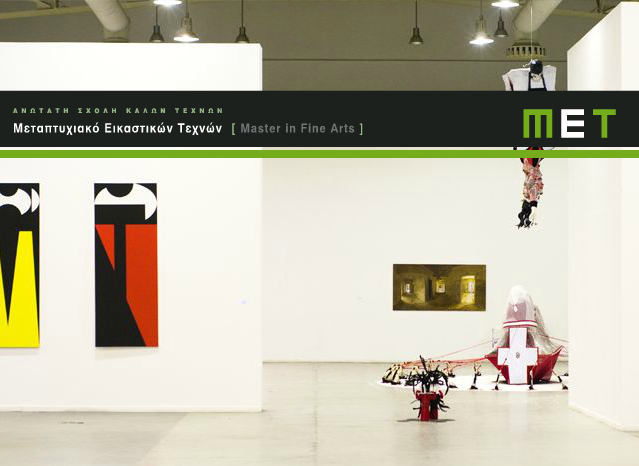MA in Visual Arts

The idea for establishing the Master’s Programme was developed within the Athens School of Fine Arts (ASFA) shortly after its relocation in 1993 to the building complex at 256 Pireos Street. The programme was conceived as a means to enrich and redefine the institution’s role, fundamentally enhancing the processes of education, research, and artistic creation in the field of visual arts in Greece.
The MA in Visual Arts offered by the Department of Visual Arts at the Athens School of Fine Arts (ASFA) was initially created out of the need to extend the undergraduate curriculum by organising a structured academic programme and establishing appropriate conditions for the development of advanced artistic thinking and creation. Its primary aim is to offer a set of specialised postgraduate studio and theoretical courses-seminars designed, in accordance with international academic standards, to provide artistic specialisation in the field of visual arts. Since its establishment in 2004, the programme has served as an innovative point of reference within the academic landscape, as it was the first postgraduate programme in the field of visual arts in Greece to align with international academic practices.
The MA in Visual Arts constitutes an educational community that fosters a field of research and interdisciplinary dialogue aimed at cultivating students’ critical thinking – both in relation to their own artistic work and to the diverse trends of the contemporary international and local visual arts landscape. In response to this landscape, which is marked on one hand by an unprecedented proliferation of viewpoints and modes of expression, and on the other by the advantage of immediate access to information, the programme community supports the creativity of emerging artists, inspiring and facilitating the artistic process toward the development and deepening of their work. The programme also seeks to cultivate self-awareness as a means of achieving artistic autonomy, enabling students to define their own position within the world of contemporary art. This is pursued through engagement with the evolving conditions brought about by shifting boundaries and rapid cultural change. The programme’s core objective is for its graduates to acquire advanced artistic skills and theoretical knowledge in areas related to contemporary visual practices, allowing them to respond effectively and confidently to the demands of their professional field – whether in the arts sector, academia, or broader areas of education and culture, both in Greece and internationally.
In the structure of the Master’s Programme, studio practice and theoretical discourse are closely interconnected. Through the attendance of courses, seminars, lectures, and interdisciplinary project studies, students engage with the ideologies that have accompanied artistic phenomena, broaden their cultural education, and develop their critical thinking in order to reflect on the cultural and historical context of their own artistic work. With the support offered by the programme, students are encouraged to formulate personal and original methods of research and inquiry, aiming to enrich and expand their artistic practice. At the same time, they are trained to organize complex creative projects and to convey their views and theoretical intentions to audiences within the art world. This approach aligns with contemporary global developments in academic visual art education.
The courses of the Master’s Programme, while maintaining their academic autonomy, are developed within this shared framework, with the primary objective of enriching students’ methodological and conceptual tools in relation to the programme’s field of study. The educational process culminates in the fourth semester, during which each student undertakes a thesis project accompanied by a theoretical dissertation relevant to the artistic research area addressed. This combined work is presented publicly to the entire academic community of the programme. This mode of instruction, as outlined above, provides a solid foundation also for those intending to pursue doctoral studies within the Department of Visual Arts, in areas concerning contemporary international and local artistic practices.
The goals of the programme will be primarily supported by the artistic and academic faculty of the Department of Visual Arts. However, a key objective is to further expand the existing collaborations with institutions and educators from both Greece and abroad – an essential prerequisite for the continuous enhancement of the programme content.
MARIOS SPILIOPOULOS
DIRECTOR OF THE MA IN VISUAL ARTS
PROFESSOR, ASFA
Faculty and teaching staff
Contact
Content 1
